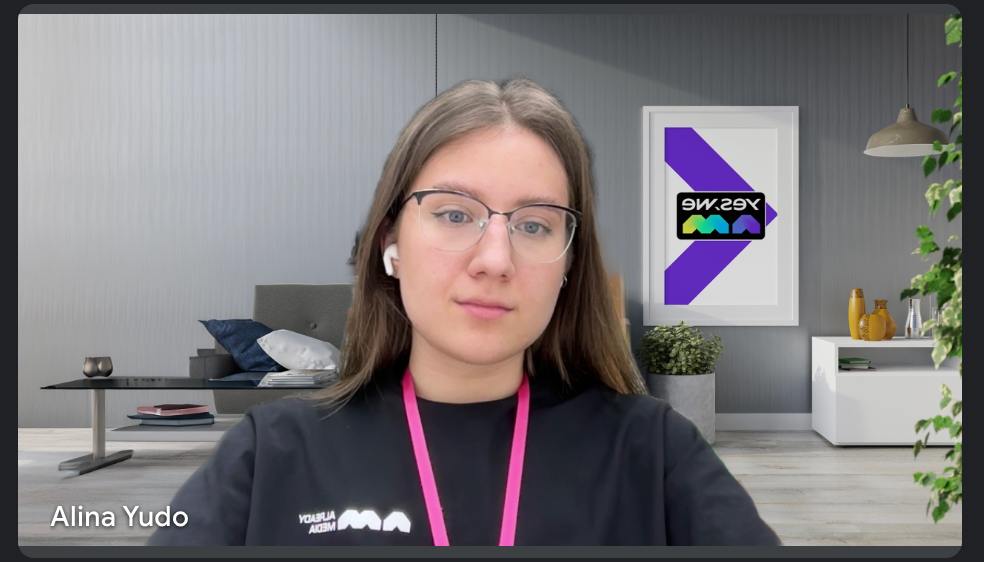
The global job market is changing fast. According to LinkedIn, around a third of professionals are actively looking for work (and over half are passively open to offers.) Every week, millions browse LinkedIn in search of a better fit.
What about timing? Research shows that half get an offer within a month. However, depending on skills and goals, it can take over 6 months.On average, the path: search → apply → final offer — takes 2–3 months. It’s truly a time- and energy-consuming process.
The iGaming industry always needs strong, skilled professionals. Interviews today are more like a two-way conversation, a real dialogue. It’s not just the company asking questions — the candidate should, too. That’s the only way to see if there’s a real match.
But which factors really make the difference? And what shouldn’t be skipped just to wrap things up faster? We asked Alina Yudo, Recruiter at Already Media, who’s made over 110 successful hires.
Alina, tell us a bit about yourself. How did your career in recruitment start, and what brought you to Already Media?
I’ve always been interested in connecting with people, being creative, and using analytical thinking. Over time, through trial and error and exploring different areas, I realized that recruitment is exactly the place where all of this comes together. It requires both analysis and attention to people, along with creativity — to find the best tactics, test ideas, and keep growing.
Already, Media isn’t the first company I’ve worked with, but it’s the first place where I truly felt that mindset that clicked. Here, they value ideas, are open to trying new things, and provide support in making them happen. That’s incredibly inspiring!
I’ve been working with Already Media for over two years as a recruiter. During this time, I’ve conducted over 400 interviews and made more than 110 job offers.
For me, recruitment is not just about selecting specialists — it’s about helping candidates make informed decisions.I believe that an interview is always a two-way process: it’s important to not only put your best foot forward but also understand if the company and the role truly fit you. My goal isn’t just to hire — it’s to find people who share our values and can seamlessly integrate into the team.

With your experience in recruitment, what qualities do you pay attention to first when speaking with candidates?
For me, making an offer isn’t just about closing a vacancy. It’s a conscious decision on both sides — will the person feel comfortable with us, and do they fit our team? This approach leads to stronger, longer-term results.
During the interview, I try to understand a bit deeper: the way the person communicates, what motivates them, their process of decision making, and whether they are able to work in a team.
Here are three things I pay special attention to when it comes to communication:
- Genuine motivation – interest in tasks, projects, and the process, not just the working conditions.
- Transparency in communication — it’s not about saying only the nice parts, it’s about being open and honest. When someone can speak clearly about doubts, mistakes, or areas to improve — it creates trust.
- Clarity in choosing a role — when a candidate understands the reasons they want this position, kinds of tasks they want to deal with, and the areas of potential growth.
Of course, that’s not the full list — there are other things too. Some qualities may be weaker, others can stand out and cover the gaps. But honesty and transparency can’t be faked or replaced.

Top 7 questions to ask at a job interview
Alina, according to your experience, what questions should candidates ask to better understand the company and the role?
Many candidates tend to forget that to see if the offer really fits, you need to understand in detail the exact way you picture this job. It’s not just about “I like the role” or “I need a job right now.” It’s about matching expectations, workflows, tasks, the role and the culture.
A job offer isn’t the final step. Next comes the trial period. You need to settle in quickly, get through it successfully, and avoid a mismatch with your expectations from the start. After over 400 interviews, I’ve identified 7 key questions that will 100% help you make an informed decision.
- What tasks will I be responsible for in the first 3-6 months?
Clarify the expectations for the first few months and evaluate how well they align with you.
- How can I successfully navigate the probation period?
Find out what is the focus and the ways to adapt to tasks quickly.
- What tools/technologies do you use?
Understand whether you need to learn new tools or work with familiar ones. Also, learn if there are any limitations on the tools used by the company.
- Who will I be working with in this role?
Find out who you’ll be interacting with and what the communication flow will be within the company.
- How are tasks assigned within the team, and how is reporting structured?
Find out who you will submit your tasks with and what format is expected for reporting progress.
- What challenges will I face in this role?
A clear answer to this question will help you avoid unpleasant surprises.
- What growth and development opportunities are available in the company?
Get information concerning potential growth and development opportunities in the near future.
What skills and expertise do you think will be most important for effective work in the future?
I believe that even now, we can identify skills that are becoming the foundation for effective work — especially in dynamic, fast-growing industries like iGaming.
There are also those skills of importance growing year by year — they are gradually moving from the “nice to have” category to the “must-have” one.
What’s important now — and will remain relevant in the near future
- Flexibility and adaptability. I think these are some of the most important skills today. Things change fast, especially in industries like iGaming. It’s crucial to quickly adjust, learn new tools, and not get lost when things don’t go as planned.
- Critical thinking and independence. Independent analysis, clear questions, and the ability to ask and make decisions without constant external control turn you from an average performer into a valuable asset. In situations where there are often no clear instructions or task corrections, it’s important not to wait for the brief but to take the initiative and move the task forward.
- Effective communication. It’s not about talking a lot but about speaking at the right time and with purpose. Being able to get to the point, ask the right questions, and — most importantly — listen saves the team a lot of time and energy.
Skills of the future that will be essential
- Working with AI and automation. Understanding AI implementation in your work: delegate routine tasks, speed up processes, and find insights. It’s no longer just a trend but a new reality. AI can be adapted to any profession, but remember, it’s not the final solution — it’s your assistant.
- Managing attention and focus. In a world of endless chats, tasks, and distractions, the ability to focus becomes a superpower. It’s the people who can stay focused who drive processes in the team.
- Psychological resilience. It’s crucial to keep focus when things don’t go according to plan.
- Today’s work reality includes deadlines, feedback, revisions, and quick shifts. It’s important to maintain balance and stay calm without taking work challenges personally.
Which specialists are always in demand at Already Media?
Since Already Media is a large SEO and media company, SEO specialists of various levels and Content Managers are the most common positions.
Additionally, to ensure balanced team growth, we frequently open roles for Linkbuilders, Text Editors, WordPress Developers, and Affiliate Managers.
We do our best to make sure the workload is evenly distributed, and our employees maintain a healthy work-life balance.
Conclusion
If you think the goal of an interview is just to guess the right answers, that approach no longer works. Companies are looking for more than just “hands”; they want people who will fit into the existing team and processes (or help build them while sharing the company’s values).
Recruiters are now looking beyond the resume, focusing on alignment not just with the professional requirements.By asking the 7 questions Alina suggested, you’ll increase your chances of finding a truly good position where you’ll stay long-term, not just add another line to your CV.

